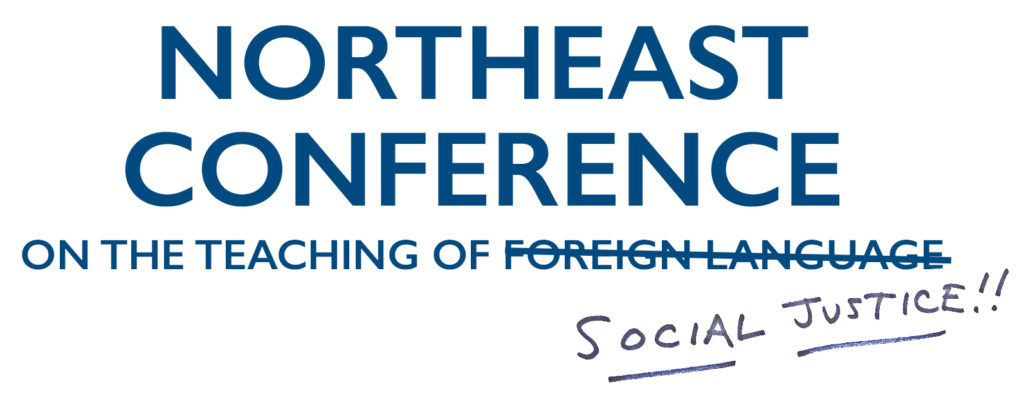A foreign language teacher's role (and any teacher's role, for that matter) is to teach the relevant subject matter, not to politically indoctrinate students. Fair enough?
Did you take a foreign language class while you were in school? If so, I assume that your classroom experience was a lot like mine. We intensely studied words, phrases, idioms, grammar and other language conventions to prepare us to communicate with other speakers of that foreign language.
Did you know that foreign language instructors have their own organizations? One of those organizations is the Northeast Conference on the Teaching of Foreign Languages (NECTFL), which “serves educators in all languages (including classical, less commonly taught, and ENL), at all levels from kindergarten through university, in both public and private settings.” This is from a webpage titled “Learn More about NECTFL.”
The NECTFL Bylaws confirm that the purpose of NECTFL is to assist in the teaching of foreign languages:
Section 2. Purpose. The Northeast Conference on the Teaching of Foreign Languages is a not-for-profit proactive regional organization that serves a broad constituency including language learners, educators and the larger community and is dedicated to the belief that all Americans must have the opportunity to learn and use English and at least one other language.
According to these bylaws, the teaching of foreign languages should be geared to the “larger community.” NECTFL purports to offer foreign language instructions to “all Americans.”
The Northeast Conference on the Teaching of Foreign Language will hold its big annual conference April 22-May 1, 2021. For many years, the theme of the NECTFL conference has been focused on the teaching of foreign language. The conference themes for the past five years reflect this:
2020: Languages for All: Envisioning Language Learning Opportunities for Every Learner
2019: Authentic Language, Authentic Learning
2018: Unleashing the POWer of Profiency [SIC]
2017: Strengthening World Language Education: Standards for Success
2016: Developing Intercultural Competence through World Languages
This year, the NECTFL conference theme is strikingly different: “Finding our Voice: World Language for Social Justice.” Instead of focusing on the pedagogy of teaching foreign languages, NECTFL has decided to aggressively push a particular political position. Based on the sessions to be offered this Spring (see below), NECTFL is doing something dramatic and new: trying to impose a controversial political ideology upon its members (and their members’ students). Even more disturbing, this year’s conference theme has nothing to do with NECTFL’s Mission Statement:
What is the mission statement of the Northeast Conference on the Teaching of Foreign Languages?
• offer both established and innovative professional development in support of language teachers and learners; and
• provide opportunities for collegial interchange on issues critical to the profession; and
• anticipate, explore, respond to and advocate for constituent needs.
NECTFL’s Mission Statement page describes a mission of helping language teachers to teach foreign languages to their students. Not one word of NECTFL’s Mission Statement suggests that NECTFL should be advocating any particular use of any foreign language for any particular political end. Therefore, this year’s conference theme is no more in keeping with NECTFL's Mission Statement than “Teaching Students to speak Foreign Languages to Advocate for the Abolition of Gun Control” or “Helping Students Use Foreign Languages to protest abortions.”
Here are the titles and descriptions of some of the “Featured Sessions” for NECTFL’s upcoming (April 2021) conference (from the NECTFL 2021 conference website):
108. Talking Social Justice: Conversations That Matter
Saturday, April 24, 2021, 12:30 PM–1:30 PM
Teachers don’t have to be afraid of controversial topics in our classrooms. We can engage students in collaborative discussions using thoughtful protocols and help them deepen their understanding of history, develop literacy skills, and build social and emotional competencies at the same time. In this session, participants will explore structures for facilitating class discussions on complex, controversial texts and topics; participate in a collaborative discussion; and plan for how to incorporate these techniques into their own curricula. (Best for grades 6-12.)
111. Becoming Agents of Change: The Work BEFORE the Work!
Saturday, April 24, 2021, 2:00 PM–3:00 PM
WHAT? You want students to be agents of change. SO WHAT? You want to teach through a social justice lense! [sic] NOW WHAT? Come explore two critical building blocks for effective social justice work: emotional literacy and perspective taking. Gain practical tools that help your students wash away the seeds of assumption and fear. Instead, plant seeds of curiosity and wonder that will be nourished through emotional connection and perspective taking.
120. Reframing Your Teaching of Culture to Emphasize Justice and Equity
Sunday, April 25, 2021, 10:00 AM–11:00 AM
Social justice issues related to fairness, human rights, and equity are inherent in the cross-cultural, reflective, and analytical nature of studying world languages and cultures. In this session, we provide a framework and instructional strategies for adding a layer of social justice to the cultural products, practices, and perspectives you currently teach. We will emphasize ways to transition your traditional or typical culture topics to include current issues, such as justice and equity issues related to the Covid-19 pandemic. Materials and resources will be shared that can be immediately incorporated into your curriculum and instruction.
Here are the titles of a few other “Featured Sessions” for the upcoming NECTFL conference:
136. Focusing Lesson Design Through Social Justice, Standards & Can-Do Statements
148. Sustained Inquiry of Social Justice Issues Through Project Based Learning
156. Going to the Movies: Developing Social Justice Units Using Film
163. Social Justice Can’t Wait: Engaging Learners from the Start
166. Elles, Muxes, and Identities in WL classroom.
The titles and descriptions of these conference sessions suggest that the teaching of foreign languages has become irrelevant to NECTFL or, at most, an afterthought. Titles like these make me wonder about the content of the handouts and PowerPoint presentations that NECTFL intends to share at its upcoming 2021 conference.

Is it possible to teach a foreign language without aggressively pushing a particular political ideology? Presumably yes, based on the fact that foreign languages have been successfully taught for centuries without any need to inject fringe politics into the classroom. Many people familiar with NECTFL’s long-standing mission will be surprised to see NECTFL advocating for these controversial political positions, all of them crammed onto the far left side of the political spectrum.
I know for a fact that more than a few foreign language teachers are concerned about NECTFL’s decision to try to indoctrinate language teachers and students with these Woke ideological positions. They consider NECTFL’s efforts to turn this year’s conference into a Woke Education Camp to be insulting, presumptuous and contrary to the Mission Statement of NECTFL. These language teachers are reluctant to speak out in public.
I am writing this post to speak on their behalf.




